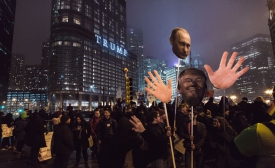climate change
U.S. representative Raúl Grijalva said climate change is the greatest danger facing the world right now in his closing speech at the Science Diplomacy and Policy with Focus on the Americas conference in Tucson. Applause erupted from the conference attendees, speakers, panelists and organizers in the audience. [...] The conference aimed to provide a “state of the art” vision for the future in science diplomacy and policy.
What can cities do to create their own foreign policy? The first article laid out four steps a foreign ministry might take to help cities engage on global challenges: supporting city-based networks, helping to deploy civic technology, working with counterpart ministries abroad to encourage vertical policy integration, and convening the global community to build momentum behind significant and widespread municipal challenges
Climate change and population growth are creating increasing pressure on food and water — and to solve the need, innovative solutions will be required. The issue of water scarcity in the near future is an issue Australia’s aid program is attempting to solve today. [...] Scientists, engineers, academics, entrepreneurs and other creative minds are encouraged to compete as a team or individual.
Despite the new U.S. President's well-known openness toward the Kremlin, I can think of no relationship where public diplomacy and exchanges are more important or harder to do than the relationship between the U.S. and Russia.

Nick Cull responds to a reader's questions on U.S.-Russia relations and global stability today compared to the Cold War.
Many members of the international community are looking for a leader they can count on to carry the torch on the Sustainable Development Agenda. Could it be Germany, the third largest donor for development assistance after the U.S. and the United Kingdom, and its chancellor, who has taken a stand on issues ranging from climate change to the refugee crisis?
When he leaves the Oval Office this month, he will have safeguarded more of the ocean than any other president, and increased the amount of protected waters around the U.S. by 20 times. His administration has also worked to improve American fisheries, clamp down on illegal fishing, and create national policies for protecting the oceans. Such measures are vital at a time when the oceans are imperiled by many threats.
China, as befits its status as a current major world power, should play a significant role, both behind the scenes and in front of them, in establishing a new order in Syria. Careful and thoughtful Chinese diplomacy, in conjunction with efforts by the other interested nations, can also create a foundation for a more peaceful Middle East and North African region in the medium- to long-term.







